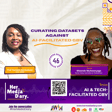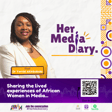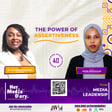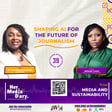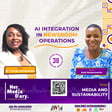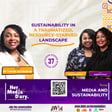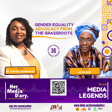
Her Media Diary Episode 47: “Linking Human Bias to AI & Machine Learning” with Deborah Kanubala
Deborah is a PhD Candidate at Universität des Saarlandes (Germany), researching fair machine learning to reduce bias against marginalized groups. Prior to her PhD, she was a Lecturer in Data Science & AI at the Academic City University College, Accra, Ghana. She is also the co‑founder of Women Promoting Science to the Younger Generation (WPSYG), an organisation supporting more girls into STEM and AI.
In this episode, Deborah unpacks how generative AI can deepen gender-based harm, especially for African women. She discusses how machine learning models are shaped by historical human bias, which is then transferred to machine learning models, leading to continued discrimination.
According to her, investing in research that focuses on auditing the systems should not be an afterthought of big tech companies but something they should embed into the system from the start.
Subscribe, leave a review and share this episode with someone who needs to hear it.
If you’d like to join an episode of this podcast, send an email to yemisi@africanwomeninmedia.com. Or visit our website at www.hermediadiary.com
Subscribe and follow Her Media Diary on all your favourite podcast platforms, Also, tune in to our partner radio stations from anywhere across Africa. And don’t forget to join the conversation using the hashtag, #hermediadiary.




